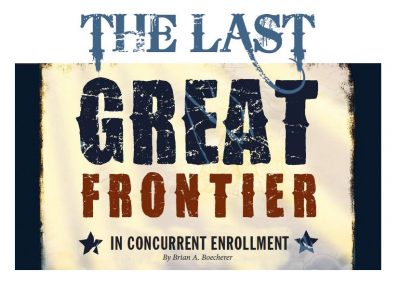By Brian A. Boecherer
For the last twelve years UConn Early College Experience (UConn ECE) has been pushing at the border of the last great frontier of concurrent enrollment – research. Not just best practices, but the production of theory and knowledge on concurrent enrollment. How does this innovative and sustainable model of education support student and instructor success? How does concurrent enrollment support student retention in higher education? How do we affect teaching and learning in low-income, urban, and rural areas? The questions are endless.
Concurrent enrollment has come of age; it is offered in every state and is even starting to move outside the United States. It is time to move the national agenda forward again. To this end, UConn ECE, Syracuse University, and Boise State University are collaborating to create a peer-reviewed journal on concurrent enrollment entitled the Concurrent Enrollment Review (CER). This first peer-reviewed academic journal on concurrent enrollment, which is three years in the making, will offer educational professionals, researchers, and policymakers insights into this interdisciplinary model of education.
Preceding the CER is a UConn legacy of research in this area. UConn ECE’s research agenda was first started in 2006 by Brian Boecherer, one year after he was hired as assistant director. At that time the office had mountains of data that it previously never had the capacity to comb through and analyze. It took two years to construct accurate student enrollment records, credit counts, and read through the archives from 1955, when the program was established. During that period Brian traveled to every partner high school, along with many new schools, every academic year and had learned what the high schools needed to better support the program. By 2008 he became the first Director of Research and Development for the office.
Armed with historic data and qualitative assessments from countless site visits and student course evaluations, an ambitious agenda was set. Brian became an active presenter on the national scene with over 25 research presentations at national conferences and a smattering of keynote addresses. He published in the first university press publication on concurrent enrollment (Syracuse University, 2016), and won a grant with his colleague Magdalena Narozniak to study concurrent enrollment transfer credit. This publication specifically focused on how credits earned through UConn ECE transfer to other universities. It is still the largest study on the topic to date and resulted in the program’s nationally recognized Credit Transfer Database.
In January 2018 Carissa Rutkauskas joined the office to take the program’s data to the next level by translating program research into something more digestible to the public. Carissa’s contributions to the research team has dramatically increased the high schools’ ability to access data, understand it, and present it to their communities. Carissa brought the Credit Transfer Database into the 21st Century along with important high school materials and data portals for the high schools. Carissa has become an active researcher in this area – in addition to overhauling of the program’s student course evaluations and the alumni one-year and four-year follow-up surveys, she is writing an article with colleague Kathrine Grant on the history and origins of concurrent enrollment.
Over the last four years, UConn crossed the border into this last great frontier to instill more intentional ways. First, UConn ECE sponsored a research grant competition for UConn professors interested in concurrent enrollment that would lead to research, national presentations, and peer-reviewed publications. Associate Professor Scott Campbell (English) and Assistant Professor Michele Back (Education) both won grants to advance their research in this area. Dr. Campbell and many of his UConn ECE instructors were accepted to present their research at the 2019 National Council of Teachers of English Annual Convention on the central role of concurrent enrollment in first-year composition. Dr. Back produced a white paper with her colleague Joseph Dean on how concurrent enrollment effectively increases the recruitment and retention of high school instructors in critical need subject areas. They are planning on developing their research into a future peer-reviewed publication.

Since 2017 Brian has been presenting with colleagues from Syracuse University and Boise State University on the need to develop an academic journal that would attract researchers from all disciplines with an interest in concurrent enrollment. After two successful national presentations, we are moving forward with the Concurrent Enrollment Review. The call for paper will be announced at the NACEP conference in St. Louis. Missouri in Fall 2020. Brian Boecherer was named the Editor-and-Chief and Syracuse’s Dr. Melanie Nappa-Carroll (Assistant Director, Syracuse University Project Advance) was named the managing editor. Dr. Scott Warren, Associate Dean for Research Excellence at Syracuse University, has heralded the CER as a necessary publication in this emerging academic field. His endorsement comes with the full support of the Syracuse Library.
The CER has two distinct parts. First, the CER will serve as a research bibliography, a clearing house, that collects the articles and abstracts of all previously published peer-reviewed articles and dissertations on concurrent enrollment. The CER has already hired a library scientist to start cataloging articles. After the initial cataloging, the Syracuse Library Artificial Intelligence (AI) system will scan all published peer-reviewed journal articles to further develop the CER bibliography clearing house. This clearinghouse will support researchers like Scott, Michele, Carissa, and so many others to develop their literature reviews and new veins of research. The second part of the CER is the journal itself, which will publish new peer-reviewed articles on concurrent enrollment. As the field is diverse, the journal’s editorial board will also be diverse and support the promotion and tenure of all professionals in this space. The founding board members have also decided to make the journal open-source, so information is available to all, regardless of location and background.
UConn ECE sees this as the next step in its legacy of leadership and innovation. UConn ECE was not only the first university to start offering concurrent enrollment in the nation; in 2000, UConn ECE was a founding member of the National Association of Concurrent Enrollment Partnerships (NACEP). Following, UConn ECE helped create the New England Association of Concurrent Enrollment Partnerships. The CER is the next step in the program’s legacy of leadership and innovation and does the program proud to also be a founding member of the first academic journal on concurrent enrollment.
